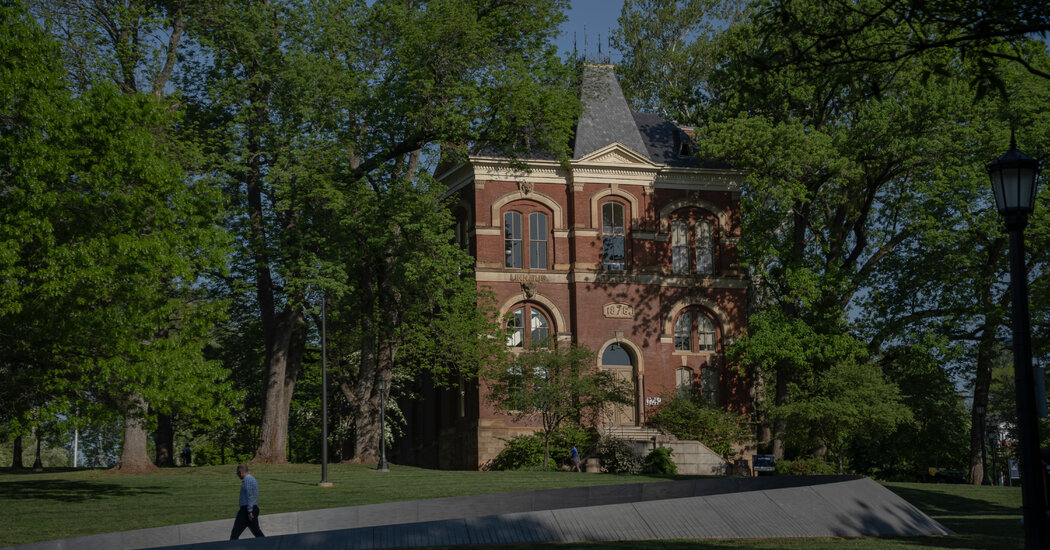The University of Virginia said on Thursday that it had suspended a longstanding campus tour service, but said the move was unrelated to complaints that the tours cast a negative historical spotlight on the school, particularly its relationship to slavery.
The tours, aimed primarily at prospective students and their families, were run by student volunteers. For several years, the tour organization, the University Guide Service, has been the focus of criticism from an organization of conservative alumni called the Jefferson Council, which has argued that the volunteer guides have alienated prospective students by providing a “woke version of U.Va. history.”
A university spokesman, Brian Coy, said the decision to pause the work of the guide service had nothing to do with that criticism. Instead, he said, the university was concerned that the group had insufficient capacity to operate the required number of tours and that the information provided during the tours wasn’t consistent.
“Some of the tours have been excellent and comprehensive, and others have been found to be in need of work,” Mr. Coy said, adding that tour guides hadn’t always shown up. “If someone drives 1,000 miles to Virginia with the thought of potentially coming to school here, we want to make sure someone is on hand.”
U.Va. said it would temporarily replace the volunteers with student interns paid by the university to lead the tours. In a statement, a university spokeswoman, Bethanie Glover, said the university would work with the guide service on an improvement plan.
The announcement came about two months after a new set of appointees selected by Gov. Glenn Youngkin, a Republican, cemented his administration’s control of the university’s governing board of trustees. His appointees now hold 13 of 17 seats.
Leaders of the guide service declined to comment but posted a notice on the group’s Instagram account. The group said it would work with the university to reinstate the volunteer tours in the spring semester, “so long as this relationship does not harm our ability to share an honest and complete account of U.Va. and its history.”
The announcement was first reported by the student-run newspaper, The Cavalier Daily. It came as U.Va., one of the country’s most selective public universities, was set to release the demographics of its entering freshman class — the first group admitted following last year’s Supreme Court decision banning the consideration of race in university admissions.
Against the backdrop of the state’s fraught racial history as the seat of the Confederacy, U.Va. became one of the first public universities in the South to admit Black students and has been lauded in the past for its efforts to increase the diversity of its student body.
In a statement issued after the Supreme Court decision last year, James E. Ryan, U.Va.’s president, said the university would do everything “within our legal authority to recruit and admit a class of students who are diverse across every possible dimension and to make every student feel welcome and included here at U.Va.”
More recently, Virginia adopted legislation banning the use of legacy preferences, which favor the children of alumni in admissions. The new law, which does not affect this year’s incoming class, could increase the diversity of Virginia’s state universities.
The Jefferson Council is an organization of conservative alumni who say their mission is to preserve Thomas Jefferson’s legacy as the founder and architect of U.Va. One of the group’s main complaints was that the guides emphasized how Mr. Jefferson was a slaveholder while downplaying his more positive contributions as a founding father and the nation’s third president.
Tom Neale, the organization’s president, wrote an open letter in June to Mr. Youngkin, in which the Jefferson Council asked that the university sever ties with the volunteer guides, among other requests.
Mr. Neale said on Thursday that the guides had started their tours by describing how the university’s land had been stolen from the Monacan Indian tribe, then segued to how the Rotunda, designed by Mr. Jefferson as the center of campus, was constructed by slave labor.
“We’ve gotten hundreds of emails, calls and texts from prospective parents saying, ‘I’m so turned off that my kid is not going to Virginia,’” said Mr. Neale, a Baltimore businessman.
“We’re not antediluvian right-wing zealots,” he added. “If we can get balanced tours, which is your first blush for many coming to U.Va., that’s all we want.”
Checkout latest world news below links :
World News || Latest News || U.S. News

